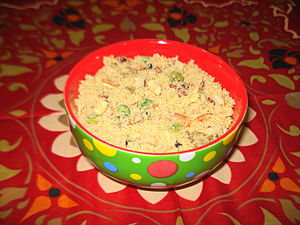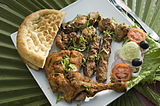 | |
| Alternative names | Kasaar |
|---|---|
| Course | Dessert |
| Place of origin | Indian subcontinent |
| Main ingredients | Whole-wheat flour, sugar, ghee, dried fruits, herbal gums |
Panjiriis sweet dish from the Indian subcontinent particularly popular in the Punjab region of both India and Pakistan which is specially prepared for Krishna Janmashtami festival. The sweet panjiri evolved from an Ayurvedic preparation called Panchajīraka.
Etymology
The term panjīrī is derived from Sanskrit word panchajīraka which is an Ayurvedic preparation. The term panchajīraka is ultimately from Sanskrit elements panch (five) and jīraka (cumin or herbal ingredients here). Panjiri is prepared by roasting wheat flour in ghee and adding dry fruits and spices like jeera (cumin), dhaniya (coriander), saunth (dry ginger powder), saunf (fennel) etc. Alternatively, the term panjeri is also used in Rajasthani dialects.Similarly, term pañjarī is used in Marathi and Gujarati languages. As per The Molesworth Marathi and English Dictionary, Pañjarī is sweetmeat composed of five ingredients, viz. ginger, coriander, ōṃvā or Ajwaen, pepper (or cocoanut), and sugar. Distributed on birthdays of Kṛṣṇa & Rāma and of children.
Regions of use
Panjiri is consumed in Indian states of Jammu, Himachal Pradesh, Punjab, Haryana, Rajasthan, Gujarat, Maharashtra, Bihar, Uttarakhand and Uttar Pradesh. It is known by the name Panchjeeraka Gudam in Southern Indian states.
Cultural uses
Panjiri is traditionally prepared in the entire Northern, Central and Western India, and is often prepared as a Prasad in Hindu prayers during Krishna Janamashtami Satyanarayan Puja. and Bhagavata Purana Katha. The Braj region in Uttar Pradesh is specially known for its traditional Panjiri prepared during Krishna Janamashtami festival. In Braj culinary tradition, Panjiri is prepared as a special bhog to commemorate birth of Lord Krishna. Apart from this, Panjiri is also prepared as an offering to Devtas on occasions like Shanti Puja, Havan, Trayodashi Vrats, Navratri Vrats, Dussehra, Janamdivas (birthdays) and other events in the Panchang, i.e. Hindu Lunisolar calendar.
Variations
Phalahari dhaniya panjiri
This Panjiri is prepared using Dhaniya, i.e. coriander seeds and is specifically prepared for Vrat. The wheat flour panjiri is replaced with Dhaniya Panjiri because consuming grains is generally not allowed during fasting, hence this dish is prepared with the powder of coriander seeds, ghee, sugar, almonds and raisins.
Pushtimargiya panjiri
This special variant of Panjiri is associated with Pushtimarg Sampradaya of Vaishnavism. Panjiri forms one of the 56 dishes of the Chhapan Bhog for Bhagwan Shrinathji, form of Bhagwan Krishna. This Panjiri is prepared as a Naivedhya for Shrinathji. The main ingredients used include : Variyali (fennel), Ajmo (carom), Dhanna (coriander), sunthi (dry ginger), pepper flakes and gari (dry coconut).
Dogra sund panjiri
In Jammu region, a special variation of Panjiri is prepared for winter season & Janamashtami Vrat and is called Sund Panjiri. This variation is prepared using lots of dry ginger powder (sund in Dogri) and is loaded with dry fruits native to hills of Jammu division.
Rajasthani gond panjiri
In Rajasthan, Panjiri or Panjeri is prepared using edible gum (also known as Gond locally). The mixture is used to prepare laddus out of it.
Mathura's panchamrit panjiri
This particular variation of panjiri is prepared using atta () as a Prashad for Satyanarayan Puja. Tulasi leaves (holy basil leaves) are also added to the mixture. It is served along with Charnamrit (a yogurt based sweet drink) and is associated with Braj region.
Phool makhana panjiri
It is prepared using phool makhanas (foxnuts) and is specially associated with Bihari cuisine.
See also
References
- Bahri, Hardev (2 August 2021). Rajpal Hindi Shabdkosh. Rajpal & Sons. ISBN 9788170280866.
- ^ "Cuisine of Jammu". www.jktdc.co.in. Retrieved 2021-08-02.
Jammu is famous all over India for Chocolate Barfi, Sund Panjeeri, Patisa and Rajma
- Malik, Abdul (2021). Microbial Biofertilizers and Micronutrient Availability The Role of Zinc in Agriculture and Human Health. Springer International Publishing. p. 419. ISBN 978-3-030-76609-2.
It is a staple from Punjab region of Pakistan and India
- Crooke, William (1888). A Rural and Agricultural Glossary for the N.W. Provinces and Oudh. Calcutta: Superintendent of Government Printing. p. 218. ISBN 9788185326009.
- O'Brien, Charmaine (2013). The Penguin Food Guide to India. New York: Penguin Books Limited. p. 32. ISBN 9789351185758.
Panjiri is a Punjabi sweet made of wheat flour or semolina cooked in ghee to which sugar, dried fruits, and natural gum are added.... These are eaten during winter to ward off cold weather ills and also given to women who are breastfeeding.
- ^ "Braj decked up for Janmashtami". Deccan Herald. 2013-08-28. Retrieved 2023-04-19.
Preparations for Wednesday's Krishna Janmashtami, the birthday of Lord Krishna, have reached a crescendo in the whole of Braj region of Uttar Pradesh... Special pakwans (dishes), laddoos, dry fruits, panjeeri, panchamrit are being prepared. Most people fast and eat only after the midnight birth of Krishna.
- ^ Amrita (2018-04-20). "Panjiri (Prasad for Indian Pooja)". The Food Samaritan. Retrieved 2023-04-22.
Panjiri is one of the Prasad (food offered to Gods and then distributed between the devotees) items which is prepared for Pooja (the Indian prayer sessions) Havan as well as on auspicious days....Shanti Havan, Janamashtami, Navratri, kids' birthdays, Dussehra and for Trayodashi fasts and other events in the Indian Lunar Calendar. Also it is common within the punjabi diaspora as it has been traditionally sent to them by their families back home.
- ^ "Janmashthmi 2020: Why is Panjiri so popular in Janmashtmi?". The Times of India. 2020-08-09. Retrieved 2021-08-02.
Panjiri is one of the quintessential delights of Krishna Janmashtmi bhog. It is offered to Lord Krishna, the eighth avatar of Lord Vishnu on the occasion of his birth anniversary.
- Peter, K. V. (2004-03-23). Handbook of Herbs and Spices: Volume 2. Elsevier. ISBN 978-1-85573-835-5.
In puerperal diseases such as fever, loss of appetite and disordered secretions after delivery, the following preparation called panchajiraka paka is used.
- Lingham), Durgadas (Rodney (2013-05-24). Foundations of Ayurveda: Ancient Indian Medical Knowledge for Modern-Day Problems. Lulu.com. ISBN 978-1-4477-7049-7.
- Varmā, Rāmacandra (1971). Saṅkshipta Hindī śabdasāgara (in Hindi). Nāgarīpracāriṇī Sabhā.
- ^ Rājasthānī-Hindī kahāvata-kośa: Aṃ se kā taka kahāvateṃ (in Hindi). Rājasthānī Granthāgāra. 2003.
- Molesworth, J. T. (James Thomas) (1857). "A dictionary, Marathi and English. 2d ed., rev. and enl". dsal.uchicago.edu. Retrieved 2024-04-25.
- Singh, K. S.; Pandita, K. N.; Charak, Sukh Dev Singh; Rizvi, Baqr Raza; India, Anthropological Survey of (2003). Jammu & Kashmir. Anthropological Survey of India. ISBN 978-81-7304-118-1.
- Borah, Jahnabee (2020-08-29). "Why Himachali cuisine is having a moment". mint. Retrieved 2021-08-02.
One of them, called panjiri, is a nourishing mix of Himachali grains and nuts, akin to muesli, and can double up as a snack or breakfast item.
- Malik, Abdul (2021). Microbial Biofertilizers and Micronutrient Availability The Role of Zinc in Agriculture and Human Health. Springer International Publishing. p. 419. ISBN 9783030766092.
It is a staple from Punjab region of Pakistan and India
- Haryana District Gazetteers: Ambala district gazetteer, 1883-84. Gazetteers Organisation, Revenue Department, Haryana. 1998.
- Singh, K. S. (1994). Haryana. Anthropological Survey of India by Manohar Publishers. ISBN 978-81-7304-091-7.
- Cultures, Institute of Traditional (1966). Bulletin of the Institute of Traditional Cultures, Madras. University of Madras.
- Lingham, Rodney (2013-05-29). Aushadh Rahasya: The Secret of Ayurvedic Herbs and Disorders of the Mind. Lulu.com. ISBN 978-1-304-08378-4.
Pancha-Jeeraka Guda Post-natal care for mothers
- Pandey, Indu Prakash (1977). Avadhī kahāvateṃ (in Hindi). Racanā Prakāśana.
- Sadaiv, Shashikant (2020). Vrat-Upvas Ke Dharmik Aur Vaigyanik Adhar (in Hindi). Prabhat Prakashan. ISBN 978-93-87980-55-6.
- ^ "Panchamrit Panjiri Prasad". Indian Vegetarian Recipes in Hindi | NishaMadhulika.com (in Hindi). 2012-01-19. Retrieved 2023-04-19.
Panchamrit Panjeeri Prasad is distributed after Satyanarayan Katha, Bhagwad Puja, Krishna Janmashthami. It is also known as Charanamrit or Charanamrut. It is called Panchamrit because it is made by mixing 5 ingredients together
- Srivatsa, Indira (2024-07-06). A TO Z INDIA - AUGUST 2024. A TO Z INDIA.
Panjiri is offered to Lord as special offerings and special prayers are held for devotees. Next day after Janamashtami, Nandutsav is celebrated in Braj in all temples and houses
- "All you need to know about dhaniya panjiri". The Times of India. ISSN 0971-8257. Retrieved 2023-04-19.
- "Saroj Shah દ્વારા રેસીપી પંજરી પુષ્ટી માર્ગીય (Panjiri Pushtimarg Recipe In Gujarati)". કૂકપૅડ (in Gujarati). Retrieved 2023-04-19.
- "Gond ke laddu Rajasthani Recipe - Recipe Gond ke laddu Rajasthani Cuisine". Rajasthan Direct. Retrieved 2023-04-19.
- "How to make Makhana Panjiri". Indian Vegetarian Recipes in Hindi | NishaMadhulika.com (in Hindi). 2022-02-08. Retrieved 2023-04-19.
| Balochi |  | ||||
|---|---|---|---|---|---|
| Kashmiri | |||||
| Muhajir |
| ||||
| Pashtun | |||||
| Punjabi |
| ||||
| Saraiki | |||||
| Sindhi | |||||
| Common dishes |
| ||||
| Pakistani diaspora | |||||